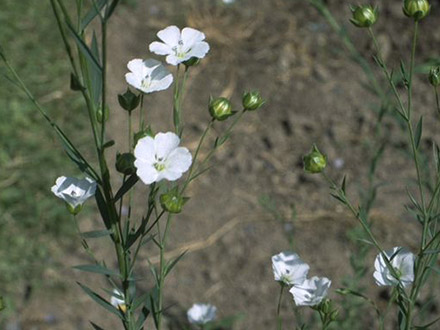Botanical name
Linum usitatissimum L.
Family
Linaceae
Common name
Flaxseed, Flax, Common flax
Information about the plant
Linseed is known as a cultivated plant. It exists in many different cultivated forms and provides flax seeds, linseed oil, and flax fibers. The main plant is closely related to the Mediterranean growing Linum angustifolium Huds. Linseed is grown almost worldwide, except in equatorial regions. It can also be cultivated at altitudes of up to 1800 meters. The harvest of seed and fibers, however, is highly dependent on climatic conditions.
The genus name is a direct translation from the Latin "linum" (= flax), while the species epithet usitatissimum is the superlative form of the Latin word "usitatus" (= usual, customary), derived from "usus" (= use, benefit), and thus reflecting the great benefits of this plant.
Linseed is an annual plant, about 1 m tall, and very delicate due to its thin, narrow, lanceolate, pointed leaves. The sky-blue, 5-rayed flowers are arranged in panicles in the axils of the upper leaves. The fruit ripens to a 10-compartment capsule containing brown seeds. Depending on the species, the flowers may be white, light blue, or purple. The flowering time is from June to July.
Medicinally used parts of plants (herbal drug)
The ripe, light brown to reddish-brown seeds are used. The commercially available drug is sourced from crops grown in Morocco, Argentina, Belgium, Hungary, and India.
Constituents of the herbal drug
Linseed contains mucilage in the seed coat and fatty oil in the endosperm, with a high proportion of polyunsaturated fatty acids.
Quality of the drug
The quality of linseed (Lini semen) is specified in the European Pharmacopoeia (Ph. Eur.).
Medical applications
Recognised medical use
The HMPC has accepted the internal use of linseed as ‘well-established use’ for chronic constipation or in cases where gentle bowel movements with soft stools are required. Mucilage preparations made from linseed have been classified by the HMPC as traditional herbal medicinal products (see also ‘Traditional use’).
ESCOP: Habitual constipation (chronic constipation) or when mild bowel movements with soft stools are desired. Supportive in cases of lipid metabolism disorders (dyslipidemia) and high blood pressure. As a demulcent preparation, taken internally for short-term use in cases of gastritis (inflammation of the stomach lining) and enteritis (inflammation of the intestines), and to relieve the symptoms of irritable bowel syndrome (colitis irritabile). Used as supportive therapy for symptoms of diverticulitis. As a mucilage preparation, used externally to support the treatment of painful skin inflammations.
The applications are based on human experience and long-standing use.
Traditional use
Flaxseed mucilage has been classified by the HMPC as a traditional herbal medicinal product (Article 16a of Directive 2001/83/EC). Based upon long-standing use, flaxseed mucilage can be used to relieve mild gastrointestinal complaints.
Herbal drug preparations in finished dosage forms
- Whole or crushed linseed
Dosage
For constipation, take 1 tablespoon (10 to 15 g) of whole or ground flaxseed 2 to 3 times daily with plenty of fluid (!). Flaxseed can also be taken pre-soaked in water. During the therapy with linseed, adequate fluid intake must be ensured.
To prepare, soak 5 to 10 g of flaxseed in cold water for 20 to 30 minutes. Then decant the liquid. For external use as a compress, process 30 to 50 g of ground flaxseed into a hot, moist pulp.
Preparation of a tea
Not applicable.
Notes
Ensure sufficient fluid intake during use!
Flaxseed should not be used if an intestinal obstruction (ileus) is suspected, recognizable by severe abdominal pain, nausea, vomiting, narrowing of the esophagus or gastrointestinal tract, acute inflammatory bowel disease, or diseases of the esophagus or stomach entrance.
Use in children under 12 years is not recommended due to a lack of evidence.
Side effects
If sufficient fluids are consumed, no side effects are expected. Flatulence may occur.
Interactions
Linseed should be taken 30 minutes to 1 hour before or after taking other medications, as it may delay the absorption of the other drugs in the gastrointestinal tract.
References
Herbal drug monographs
Further literature
Commentary on the European Pharmacopoeia (Flaxseed, No. 0095)


